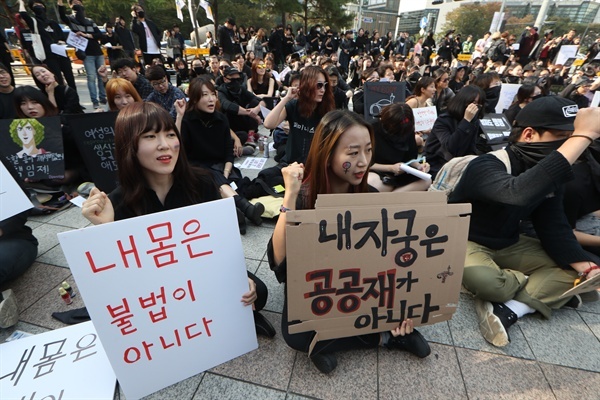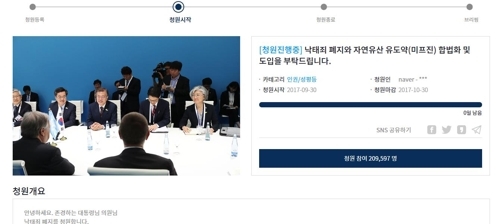The presidential office said Monday that it will clarify its stance on abortion, which is illegal in Korea with few exceptions, after more than 200,000 people signed an online petition to decriminalize it.
“As Cheong Wa Dae is supposed to give a reply when a petition is signed by more than 200,000 people, we will of course prepare (an answer),” an official from Cheong Wa Dae told reporters.
The presidential office has made it a rule to make an official reply at a minister- or presidential secretary-level when a petition -- registered on its official homepage -- gathers 200,000 signatures within 30 days, as a way to promote “direct communication” between the president and public.
 |
Participants shout slogans condemning the government’s plan to toughen punishment for illegal abortions during a rally in central Seoul last year. (Yonhap) |
“We should discuss whether the answer should be provided (to the public) by the government or Cheong Wa Dae,” the official said.
He noted as the requested lifting of the abortion ban requires a revision of the existing law, it is a matter to be dealt with at the National Assembly and cannot proceed with a presidential order.
The number of pro-choice petitioners was 233,424 as of Monday. The petition was posted to the presidential office’s website on Sept. 30. Cheong Wa Dae has 30 days to respond.
 |
A screenshot of the petition posted to the presidential office’s website (Cheong Wa Dae) |
“I ask for abolition of the abortion ban. Unwanted pregnancy is a tragedy to the woman, to the baby and to the state,” the petition reads, also demanding the government allow the sale of abortion pills, such as Mifegyne, in South Korea.
Abortion is illegal under Article 269 of the Criminal Act, except when the mother’s health is at risk or in cases of rape, incest or severe hereditary disorders. All abortions -- no matter the circumstances -- are outlawed after 24 weeks of pregnancy.
Women who violate the rule can be sentenced to a prison term of up to one year or a fine of 2 million won ($1,800), while their male partner is excluded from the punishment. Doctors who perform illegal procedures face up to two years in prison.
If the ban is to stay, the lead petitioner argued, men should also be held accountable for illegal abortions, not only women. “It‘s unfair to hold only women responsible for abortion through the current law.”
Though illegal, abortions still regularly take place at clinics often at hefty costs. Those who received and performed abortion operations have rarely been punished here.
With no exact figures available, the government estimates that some 170,000 abortions are conducted each year, with only 5 percent of them being legal.
Now, with the rising social and economic statuses of women, there are growing calls for scrapping the nation’s draconian abortion ban.
The public, though, remain divided on the issue. Those against abortion argue the fetus has a right to life and abortion amounts to murder, while pro-choice advocates cite women’s rights to control their own bodies.
In 2012, the Constitutional Court split 4-4 on the constitutionality of the ban, allowing the abortion prohibition to maintain its legal status. But in the minority opinion the court admitted to the abortion ban’s possible violation of women’s right to choose.
In September 2016, the Ministry of Health and Welfare, under the conservative Park Geun-hye administration, proposed a revision to ban abortions more strictly by increasing the penalty for doctors who perform illegal abortions.
The move faced strong resistance from women’s rights activists who said that decisions about their bodies and health should be made by themselves, not by politicians or government officials. Hundreds of people held a “Black Protest” in central Seoul to call on the government to legalize abortions.
This is the second time a public petition has surpassed the 200,000 mark, following one calling on the revision of a youth law that prevents a person aged under 14 from receiving criminal punishment in light of cruel crimes involving teenagers in recent months.
By Ock Hyun-ju (
laeticia.ock@heraldcorp.com)





![[Weekender] Korea's traditional sauce culture gains global recognition](http://res.heraldm.com/phpwas/restmb_idxmake.php?idx=644&simg=/content/image/2024/11/21/20241121050153_0.jpg)



